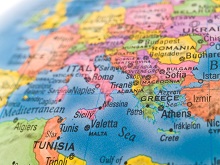The Albanian Language, in Its Own Language Family Branch
October 10, 2016

I'm Yoshi. I took the plunge into the translation industry because I was drawn to international work, and I'm now in my second year at Arc Communications. Since coming to Arc, I've realized through my day-to-day discoveries and studies just how deep and layered translation is. I'd like to carefully process the things I've learned, make steady progress, and introduce what I've learned to all of you through this blog.
Since coming to work at a translation agency, I have become much more conscious of how fascinating languages are. Sometimes the same words will have different nuances in various regions, or show historical influences. Arc Communications deals with forty-four languages. Since the moment I set my eyes on that list, the language that I have been especially curious about is Albanian. I had a vague image of Albania as a cold country, but I knew absolutely nothing about the Albanian language.
So in preparation for the day when I need to handle an Albanian translation, I decided to look up information about the Albanian language.I Started with the Absolute Basics. Where is Albania, Anyway?
Though I had heard the word "Albania," I didn't actually know exactly where the country was. As I looked into it, I discovered that many people have the mistaken idea that it is "near Russia" or that it's "one of the three Baltic States." Albania is an Eastern European country located on the western side of the Balkan peninsula. Macedonia borders it to the northeast and Greece to the southeast. Italy is separated by a sea, but is just 72 kilometers away.
From the middle of the third century BC, Albania was part of the Roman Empire. From the fourteenth century, it was under the rule of Ottoman Turkey, but it gained independence in the Balkan War of 1912. One characteristic of the country, due to the influence of its long rule by Ottoman Turkey, is that--unusually for Europe--half of its population is Muslim. By the way, in kanji, Albania is written "阿爾巴尼亜."
The Albanian Language, in Its Own Language Family Branch
Albanian belongs to the Indo-European language family. The area in which Indo-European languages are spoken includes Europe, North and South Asia, Africa, North and South America, and Oceania. Most languages belonging to the Indo-European language family are divided into several major language groups. It is well known that English and German are Germanic languages, Italian and French are among the Romance languages, and Russian and Czech are among the Slavic languages. Albanian does not belong in any of these groups and is treated as being in its own branch of the language family. As with other languages occupying their own language family branches, like Greek and Armenian, Albanian has long had its own unique development, independent of other languages. Because of its complex history, Albanian has previously used the Arabic and Greek writing systems and various alphabets. There was a unification movement in the second half of the eighteenth century, leading to Albanian's adoption of its own unique writing system, which makes use of the Roman alphabet. This system is still in use today.
The More You Learn, the More You Realize Just How Complex the Albanian Language Is
Having learned basic information about Albanian history and its influence on the Albanian language, my interest was piqued. When I then turned to look at the actual Albanian language, I found that the more I learned about it, the more I grasped just how complex and exceedingly difficult it is. It has twenty-nine consonants. I couldn't begin to understand the pronunciation system just by reading explanations. One might expect that diacritical marks would be used to show distinctive elements of pronunciation. Interestingly, instead of using such marks, Albanian has a system of combining two letters to form a new letter. For example, the rolled "r" is written "rr" in Albanian. If there is just a single "r," it's not rolled. In addition to the pronunciation and the writing system, the grammar is also quite difficult. For example, we learn that "nouns have five cases, the nominative, genitive, dative, accusative, and ablative." It would seem that any translations would require scrupulous checking.
I Ought to Learn the Basics of the Forty-Four Languages We Translate
Having read up on Albanian, the language among the forty-four we translate that seemed least familiar, somehow I felt closer to the whole forty-four. I want to continue to learn about the historical background and characteristics of each language, thus preparing myself to deal with translation projects from many languages.
Related Services
| << Arc Communications Inc. Employee Self-Introduction by Yoshi | Studying Foreign Languages Through NHK's Language Programs >> |
To Contact Us Regarding Our Translation Services
For urgent needs, call:
+81-3-5730-6133
